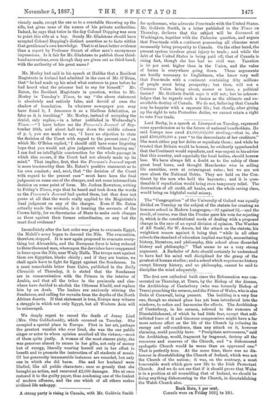Mr. Morley had said in his speech at Halifax that
a Resident Magistrate in Ireland had admitted in the case of Mr. O'Brien, that " he had made up his mind what sentence to pass before he had heard what the prisoner had to say for himself." Mr. Eaton, the Resident Magistrate in question, writes to Mr. Morley in Tuesday's Times, to say "the above statement is absolutely and entirely false, and devoid of even the shadow of foundation, In whatever newspaper you may have found it, I denounce it as a libellous fabrication, as false as it is insulting." Mr. Morley, instead of accepting the denial, only replies,—in a letter published in Wednesday's Times :—" I have before me the Freeman's Journal of Sep- tember 26th, and about half way down the middle column of p. 5, you are made to say, `I have no objection to state the decision of the Court with regard to the present case ;' on which Mr. O'Brien replied, I should still have some lingering hope that you would not give judgment without hearing me.' I can find no intelligible construction for the whole passage in which this occurs, if the Court had not already made up its mind." That implies, first, that the Freeman's Journal report is more trustworthy than Mr. Eaton's positive statement as to his own conduct ; and, next, that "the decision of the Court with regard to the present case" must have been the final judgment on some one of the charges, and not some intermediate decision on some point of form. Mr. Joshua Rowntree, writing to Friday's Times, says that he heard and took down the words as the Freeman's Journal had quoted them, but that does not prove at all that the words really applied to the Magistrate's final judgment on any of the charges. Even if Mr. Eaton actually made the mistake, is it treating the servants of the Crown fairly, for ex-Secretaries of State to make such charges as these against their former subordinates, on any but the most final evidence ?


















































 Previous page
Previous page